FP463 – The Irregular Division: Violations, Part 2 of 3
Welcome to Flash Pulp, episode four hundred and sixty-three.
Tonight we present The Irregular Division: Violations, Part 2 of 3
(Part 1 – Part 2 – Part 3)
[audio:http://traffic.libsyn.com/skinner/FlashPulp463.mp3]Download MP3
This week’s episodes are brought to you by Six Stories Told at Night!
Flash Pulp is an experiment in broadcasting fresh pulp stories in the modern age – three to ten minutes of fiction brought to you Monday, Wednesday and Friday evenings.
Tonight we return to the near future, where the founding members of the Irregular Division – Milo Smith, AKA Head, the corporate thief with his brain hooked into a prototype computer interface, and Jennifer Glat, AKA Ms. Atlas, a military lifer whose body was augmented by science after massive combat injuries – find themselves in an increasingly upsetting meeting.
The Irregular Division: Violations, Part 2 of 3
Written by J.R.D. Skinner
Art and Narration by Opopanax
and Audio produced by Jessica May
[Atlas, excerpts from Operation Pay the Pied Piper debrief, continued]
Departing the initial meeting we were furnished a vehicle in which Colonel Wily drove us to the airfield. While enroute I raised a minor concern regarding the integrity of the chain of command. I was quickly straightened out.
[Head, excerpts from the WIRED interview article “Like A Hole In the Him”, continued]
Now, I’m not saying I’m a complainer. Atlas would, but I’m not. I like to think of myself as a vocal realist: An activist on the behalf of reality, if you will. That said, as we exited Atlas surprised me by, for the first time I could ever recall, immediately questioning Wily’s judgement.
The vehicle Dame Judy Dench had driven us in was still sitting along the mighty U that marked where the drive encountered the house, but she was lost somewhere else in Vlad Tepis’ summer villa. As such we were provided with – and by we I mean Wily – the keys to a Benz from, and I quote, “the motor pool.”
That’s what I’m talking about when I try to differentiate the level of wealth. Some folks have garages, some people even have car collections – Theodore Turtledove had a motor pool.
Anyhow, like I was saying, Atlas had questions. Sometimes it seems like her high-powered cyber vision only sees things in black and white, so having her wonder about matters beyond “how many people will be attempting to murder us” and “how many people will I be attempting to murder” struck me as unusual.
I’m not sure Wily noticed though. He hadn’t spent my hours locked in cushionless vehicles with her, nervously trying to kill time before it came time for something to try and kill you.
It’s funny – the Irregulars are sort of like family in that sense. Atlas isn’t the kind of person I would have picked up as a friend on my own, yet she’d become my wrongheaded sister. I might argue with her over how we conducted business, but, even then, I knew biting at her thumbnail was the only sign she’d ever allow of nerves, knew that the reason she preferred being busy was because the alternative was still sitting in an empty room mourning her dead daughter, knew that at some level she sort of wished they’d left her ragged body to bleed out in the field instead of turning her into a patchwork mix of woman and Terminator – and knew, especially, that asking even small questions meant she was carrying some large doubts.
Doubts like:
“How does a civilian find himself giving orders to military personnel?”
“What exactly is the nature of Mr. Turtledove’s business?”
“Will local law enforcement be involved in this operation? It seems, to me, to be more appropriately under their jurisdiction.”
Now, I had a lot of thoughts I wanted to share coming out of that meeting as well, but mine were mostly about the dead-eyed torso I’d spotted behind Theodore’s shower curtain.
Maybe her questions carried my own curiosity, or maybe I wanted to stoke that tiny spark of rebelliousness I thought I’d spotted in her tone – whatever the case I decided my questions would wait and instead backed my partner.
“No, seriously though, what is Turtledove’s involvement in this?” I asked.
“He knows people. We wouldn’t be on top of this thing without him,” replied Wily.
“So you’re saying he’s deeply connected in the world of pedophiles?”
“No, that’s not what I’m saying at all, and you know it.”
I was a lot more willing to chase the point than she was – I’m sure she felt even her minor questions were already a step to close to a court martial or some nonsense – but I didn’t get anywhere either. Wily’s a man so vague he refers to his mother as “a woman I knew once.”
The dodging annoyed me. Maybe it’s a hereditary thing, but it just made me want to dig harder.
It was a bit of a drive, and I got nowhere.
Finally I decided to drop my secret weapon: “What’s with the torso Turtledove has a straw stuck in?”
It was too big – too weird – a question to avoid entirely, but I suspect the reality is that Wily gave me a bit of an answer both to shut me up in the moment and because he knew that whatever I’d seen had been recorded in my monitoring software.
To paraphrase: Turtledove wasn’t just an elderly man, he was an ancient man. He’d aged along the cusp of technology for decades – limb transplants, nutrients baths, and hormone replacements had kept him alive and vigorous for over a hundred and thirty years. Now he was onto the newest development, parabiosis.
You should Google it, but the basics are all well understood lab techniques. Connect an old meat bag to a young meat bag and you can sort of turn them into one mega meat bag. Cycle the senior’s fluids into the junior and watch the miraculous results: A return of physical strength, rejuvenated mental prowess, and, most importantly, extended lifespan.
Turtledove’s pruned sidekick was a brain dead car crash victim whose family had rented him out to pay off his medical debt. The tubes, Wily pointed out helpfully, were so that he could be replaced once his meter ran out.
His approach wasn’t illegal. Though it might shorten his human battery’s life, so would have a career in the coal mines. Was it Turtledove’s fault that he was rich enough to use an obscure, and yes, perhaps distasteful, method to extend his life? His contacts and breadth of knowledge were exactly what made him such a valuable asset.
Or such was the argument the Colonel laid out the rest of the way to our plane.
I remember Atlas was quiet for that part of the conversation, simply nodding.
[Atlas]
The flight into Capital City was short and conducted on a light jet. We landed at the commercial airport and were met in the parking lot by a man wearing civilian clothes and military regulation haircut. The decision was made that I would drive, as I often suspect Smith gets distracted with online nonsense while operating vehicles. I didn’t need the operation compromised by his crashing the car while watching the new Queen Sofia Esperon trailer.
[Head]
While we were flying in I skimmed the video from the meeting to see if I’d missed anything, and it was only then that the name of our target fully connected: Timothy Mustard.
Oddly, I’d met him. He’d been something of a boogey man when I was a kid. Not long after we moved to Capital City he appeared one day at my Dad and I’s door. It was rare to get an unexpected knock like that, as we lived in an apartment and visitors usually had to call up first to be rung in, and I remember his thin face staring down at me over a huge brown-toothed grin when I answered.
He’d seemed very friendly. He’d seemed, in fact, like a kid at Christmas.
Then Dad put his hand on my shoulder and shuffled me out of the way. Ten minutes later I heard the deadbolt flipped shut and I was told not to speak to the man again – to, in fact, keep watch for his greedy eyes and be sure I was never caught out alone with him.
I was still thinking on that when Atlas pulled our gray sedan up along the curb.
I’d barely noticed that I’d arrived home.
[Atlas]
While I will fight to the death to defend it, I do truly hate Capital City. I hate how close everyone is, how exposed you feel on its streets, and, most of all, the traffic.
It was then especially annoying that our assignment devolved, at that point, into aimless driving.
[Head]
Our little plan was conspicuously missing a deadline. Usually these things are laid out with a bunch of specifics to be handled at oh-eight-hundred hours, or whatever the hell, but here we simply had a task with an address: Go to 403 Pine, retrieve a white audio cassette from one Timothy Mustard, convicted pedophile. The cassette would likely be unlabelled but a yellow smiley face sticker would be visible in the upper left corner of the B side.
We were not, under any circumstances, to listen to the recording.
About that last part: As far as I was concerned we might as well have been retrieving wax cylinders for one of Edison’s phonographs. I had no idea where I’d even be able to find a machine ancient enough to play such a thing.
The more I thought about it, though, the more I had to agree with Atlas. What the hell were we doing on this gig? There was no PR angle here, there was no mass panic to quell or patriotic points to be scored. If you stripped it right back it was like we’d been flown in to steal an ex-convict’s mixtape.
We’d been given a credit card against which we were supposed to pile up receipts for gas, food, and lodging as necessary. I was all for checking into the Capital Hilton when we arrived at Mustard’s and found he wasn’t there, but Atlas was, as far as she was concerned, on duty until we were back on a plane. I think the city was also getting to her. She just white knuckled the steering wheel and kept pushing us down side streets in an expanding figure 8 that brought us regularly past Timothy’s shabby little bungalow.
It wasn’t the greatest neighbourhood – it was flanked on one side by the last dregs of a slowly emptying commercial block, and on the other by an ever-expanding industrial park.
We batted theories as to why we’d been sent back and forth while we conducted our tour: Mustard’s house, past an empty building whose paint was still whiter where the KFC signage had once been, past Mustard’s again, then by a sprawl of chain-link fences, rusting barrels, and the sort of warehouses that are so large they don’t bother fixing the windows if a few up top get shattered.
Dusk settled in and so did boredom. If Atlas wanted to pace I’d let her, but I was increasingly sure we were better off getting a decent night’s sleep and knocking on his door the following day.
I’ll be honest, I was poking around on social media to see if any of my friends were still in the city when I spotted him.
We’d been given a picture – his mug shot – for reference, but it was my memory of that day at the door that hit me when we crossed his path. Jailhouse photography couldn’t have captured that filthy grin.
Here was Timothy Mustard, ancient and yellowing, out after dark with a boombox in one hand and a child of maybe eight holding the other.
Atlas had been making a left and I’d glanced out the window to the right. I’d had the pair in my sight for no more than three seconds total, but seeing him opening a maintenance entrance into one of the great brickwork buildings was enough to cause me to yell, “stop” and then leap from my seat.
I guess he just looked so old – so fragile – and the kid so young. I wasn’t really thinking I was in any danger.
[Atlas]
 Smith’s sudden evacuation of the vehicle was, in some senses, a positive development, but again I was left in an awkward position due to a lack of clear operational boundaries. Was I in a position to violate local traffic laws? Could I have justified the legal or financial risk of simply exiting the car in the middle of the street in a high-risk Capital City neighbourhood?
Smith’s sudden evacuation of the vehicle was, in some senses, a positive development, but again I was left in an awkward position due to a lack of clear operational boundaries. Was I in a position to violate local traffic laws? Could I have justified the legal or financial risk of simply exiting the car in the middle of the street in a high-risk Capital City neighbourhood?
I was forced to find some middle ground by reversing onto the street we’d just departed and then pulling to a stop at the curb. Head had, by then, disappeared into the factory, and knew I was several critical seconds behind.
[Head]
Despite my shouting to stop, he didn’t hear me. He was wearing a pair of those construction-site industrial ear protectors – they were ridiculously oversized on his shriveled old man head. I didn’t know why he was wearing them, and, frankly, I was more caught up in the mystery of why the little mop-headed brat wasn’t even turning to acknowledge me.
His steps were strangely docile for someone of any age being led into the darkness of a black factory. You might see one on TV every now and then, but you can’t understand just how spooky those totally automated shops are until you’re walking the floor after dark.
There’s no glow from displays – there are no displays at all, no one would ever see them – and there are no lights unless you know where the switch is. I didn’t and Mustard didn’t seem to care. He was headed towards a rectangle of light on the far side of the floor – the door into the next area, where he’d apparently already prepared a nest.
So the bony-elbowed predator and his young prey drifted forward ahead of me, the roar of mechanical systems operating in the blackness to our right and that stupid boombox lost in their hum.
The problem with having a computer in your brain is that you stop carrying a phone. I really could have used a flashlight at that point. Trying not to think about what kind of thrashing metal pistons might be pumping beyond my vision, I made a dash for the silhouettes receding towards the exit.
I still don’t understand the technology behind it, but the moment my ear distinguished the music’s rhythm from the thumping of the machinery my brain kicked into autopilot.
It wasn’t that I blacked out – I knew where I was, who I was. I just – I wanted to stroll along to that tempo forever. I suddenly had all the affection in the world for that song. My heart lifted, my steps lightened. I’d have followed Mustard anywhere even though he still wasn’t aware I was a dozen steps behind him.
“No reason to be scared, I helped build this place. I kept a key,” he was telling the child, who, honestly, didn’t look like he was minding much at all.
For a moment we danced there in the dark, both terrifyingly out of control and blissfully unaware of the blood that was about to flow.
Flash Pulp is presented by http://skinner.fm, and is released under the Creative Commons Attribution-Noncommercial 3.0 Unported License.
Intro and outro work provided by Jay Langejans of The New Fiction Writers podcast.
Freesound.org credits:
Text and audio commentaries can be sent to comments@flashpulp.com – but be aware that it may appear in the FlashCast.
– and thanks to you, for reading. If you enjoyed the story, tell your friends.
 Turtledove, though – Atlas and I were escorted to a black Escalade late one afternoon and told to get inside. Our own Major Nelson Wily was already in the passenger seat, but the driver wasn’t military. Her hair was short, but the crisp cut of her black suit and white silk blouse was decidedly private sector. The easiest shorthand is that she looked like a mean Dame Judy Dench, and she was obviously making too much money to be a government employee.
Turtledove, though – Atlas and I were escorted to a black Escalade late one afternoon and told to get inside. Our own Major Nelson Wily was already in the passenger seat, but the driver wasn’t military. Her hair was short, but the crisp cut of her black suit and white silk blouse was decidedly private sector. The easiest shorthand is that she looked like a mean Dame Judy Dench, and she was obviously making too much money to be a government employee.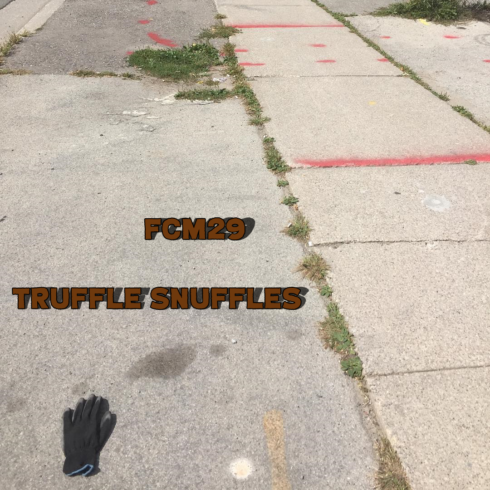
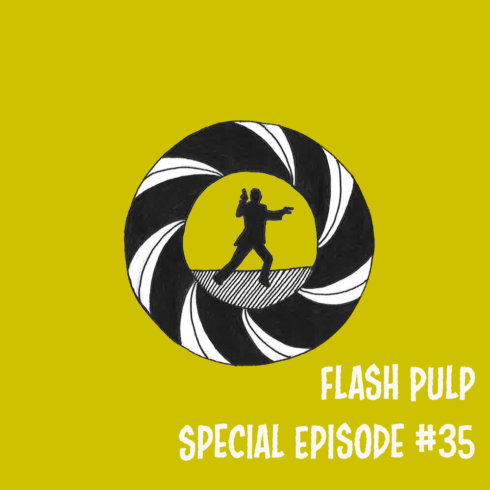
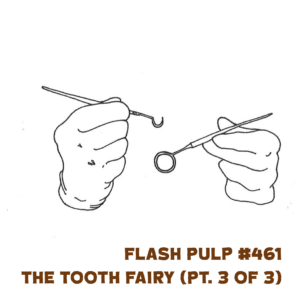 “I kind of get it though: How many hours do you spend in the chair with those folks? Maybe some of them you feel like you get to know. You see them in for their own suddenly missing teeth, or they’ve got a black eye, or a broken arm, and you ask what’s up.
“I kind of get it though: How many hours do you spend in the chair with those folks? Maybe some of them you feel like you get to know. You see them in for their own suddenly missing teeth, or they’ve got a black eye, or a broken arm, and you ask what’s up.
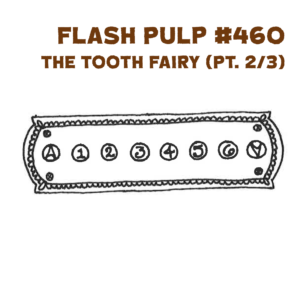 As the panel above the door counted off the floors of his ascent he worked hard not to raise a questioning brow at the camera. He was equally convinced that the woman in the front office was watching him carefully as he climbed, noting his departure on the twentieth – and topmost – floor, just in case she should be forced to give suddenly-summoned police officers directions on where the likely vagrant had gone.
As the panel above the door counted off the floors of his ascent he worked hard not to raise a questioning brow at the camera. He was equally convinced that the woman in the front office was watching him carefully as he climbed, noting his departure on the twentieth – and topmost – floor, just in case she should be forced to give suddenly-summoned police officers directions on where the likely vagrant had gone.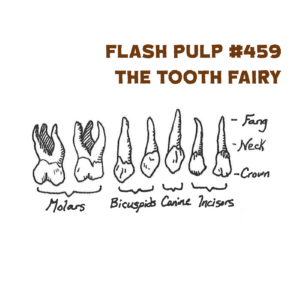 “Yeah, well, listen, Johnnie Walker was helping me unspool the story, and sometimes, you know, when I’ve had a few, I get some weird notions.”
“Yeah, well, listen, Johnnie Walker was helping me unspool the story, and sometimes, you know, when I’ve had a few, I get some weird notions.”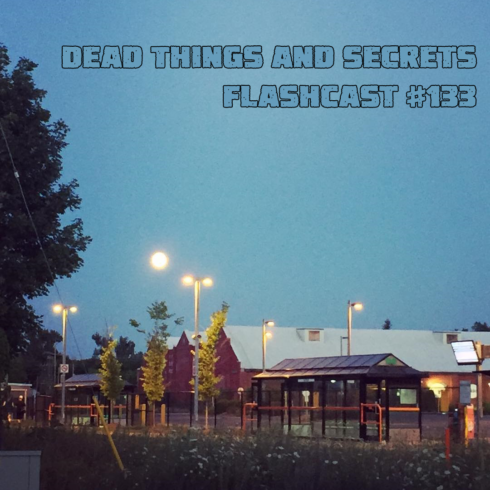
 Most of their traffic was local: Decades back the highway had been so efficiently straightened the town was no longer needed, but there was still a large enough dead spot between Capital City and Riverside, for those unthinking enough to have forgotten to fuel up, that the shop had managed to stagger on.
Most of their traffic was local: Decades back the highway had been so efficiently straightened the town was no longer needed, but there was still a large enough dead spot between Capital City and Riverside, for those unthinking enough to have forgotten to fuel up, that the shop had managed to stagger on.